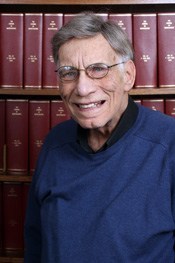By

Robert "Bob" Fox
Born: September 10th, 1966
Died: December 12th, 2018
Obituary
We Remember Robert “Bob” Fox, Ph.D., professor of Psychology emeritus, and a long-time member of the Vanderbilt Kennedy Center, died Wednesday, Dec. 12, 2018, after a short illness. He was 86.
A Cincinnati native, Fox received his Ph.D. from the University of Cincinnati in 1963; his dissertation advisor was William December. The summer of that year, Bob began his long association with Vanderbilt, where he studied and taught visual perception for his entire career. Fox retired in 2012, and in recognition of his enduring contributions to his field of study, he was awarded the title of professor emeritus. He maintained an on-campus office and research laboratory until his death.
Within vision science, Bob is recognized for his landmark studies of animal vision and human vision, both infant and adult. He is perhaps best known for his foundational work on binocular rivalry, with a series of landmark papers in the 60’s and 70’s that sparked interest in rivalry within our field. Bob enjoyed decades of continuous grant funding, and his papers were published in the very best journals in his field including Nature, Science, Journal of Experimental Psychology, and Vision Research.
He was an elected fellow of the American Psychological Association, a charter fellow of the Association for Psychological Science, an elected fellow of the American Association for the Advancement of Science, and a founding member of the Vanderbilt Vision Research Center. Over the decades he trained a host of graduate students who themselves went on to enjoy productive careers. Bob also played an essential role in guiding decades of vibrant growth by the Vanderbilt Psychology Department, and in 2013 the Department honored his legacy by establishing and endowing an award in his name given annually to a post-graduate researcher within the Department.
“Robert Fox envisioned opportunities for vision science and neuroscience at Vanderbilt that changed the landscape,” said Jeffrey D. Schall, Ph.D., E. Bronson Ingram Professor of Neuroscience and director of the Vanderbilt Vision Research Center. “Were it not for his foresight and influence, neither Randolph Blake, AB Bonds, Vivien Casagrande, Jon Kaas, Maureen Powers, nor I would have been on the faculty here. Moreover, the Department of Psychology would not be in Wilson Hall, the Vanderbilt Vision Research Center would not exist, and the Vanderbilt Kennedy Center may not have been sustained.”
“In his laboratory, Bob pioneered studies of infants’ capacity for visual perception of depth and biological motion, and he later demonstrated perceptual concomitants of intellectual disability. His research on binocular rivalry was pivotal for some of my own research. Hence, I was thrilled to have the opportunity to join the faculty of the Department of Psychology, where I enjoyed many years of scientific and personal interactions with Bob. Indeed, in recent weeks we had been communicating about one of his current manuscripts. Bob’s legacy is assured through his foundational contributions to vision science, the impactful careers of his graduate student and postdoctoral trainees, and his visionary imprint on Vanderbilt. He will be missed.”
In addition to Fox’s many contributions as a vision scientist, he was a loving father and doting grandfather. He is survived by a daughter, Jenny Wells of Narberth, PA, and a son, Dean of Lebanon, TN, a long-time close friend, Dona Tapp, of Nashville, and five grandchildren and one great-grandchild.
